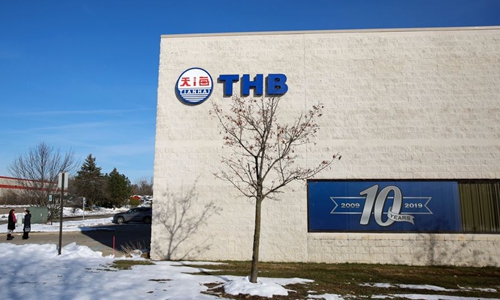HOME >> SOURCE
Chinese company taps potential of auto industry in US Michigan
Source:Xinhua Published: 2019/12/6 9:48:41

Photo taken on Nov. 17, 2019 shows the building of Tianhai Electric North America in the suburb area of Detroit, the United States. (Xinhua/Wang Ping) (Photo:Xinhua)
A Chinese automobile parts company, which has prospered in US midwest state of Michigan for a decade, is furthering its efforts to tap the potential of the local auto industry.
"What we [can] do right now is to prepare for the day when the displeasure is over. I believe it will be," said Bill Zhuang, president and CEO of Tianhai Electric North America, adding that US-China relations are going through a difficult time.
Based in Detroit with an annual revenue of nearly 200 million US dollars, the company operates as the overseas branch of THB Group, China's top supplier of wiring harness and electronic connection system for automobile production.
Zhuang said the world's automotive production has spanned more than a century to transit into the current era that features heavy reliance on the global supply chain. And Michigan, one of the industry's world hubs and home to more than three-quarters of all automotive research and development in North America, is no exception.
He said his company has striven to remain cohesive in the global supply chain, devoted to maintaining close ties with the three major US automobile manufacturers: General Motors, Ford and Chrysler, whose headquarters are all located in the Detroit metropolitan area.
"We have also been taking advantage of this special period to improve the unity of our team and tap deeper into the potential of the local auto industry," Zhuang explained.
His company, with 1,200 employees in a headquarters in Detroit and two factories in Mexico, is churning out one third of the total revenue of the parent company based in central China's Henan Province, said Zhuang, who has benefitted from a combination of education in mathematics, computer information science and business management.
Having been in charge of the company for over a year, Zhuang has made it a priority to keep the company committed to fusing the high technology of the West Coast with the manufacturing power of the East Coast, and technology advancement is part of it.
"Look, the full wire length in a car used to be 3 km long. We've seen some auto makers shorten it to 1.5 km. What a transformative designing power it is! There is still new potential. Several hundreds of meters in full length are not a dream. This will reduce overall costs for car makers," he said, adding that "we need to be involved in projects like this."
Zhuang has also started working on a blueprint beyond 2020 for his company, taking a new interest in the European market.
"We're eyeing the European market. By selling our connectors to BMW, Volkswagen, Mercedes-Benz and Renault, our overseas revenues are not only to double, but to hike by two to three times," said Zhuang, adding that "some of the European giants have inquired us about advanced technology and ways to cooperate."
He said that Europe is Tianhai's next target, because the Chinese market is saturated with qualified manufacturers of fuel automobiles and electrified vehicles and the US market is struggling to cope with the government's precipitous tariffs imposed on imported auto parts.
Zhuang, who came from Beijing in the 1990s and has divided his career between the United States and Shanghai for the past three decades, is now well into his 50s and prides himself on staff management.
He encourages his colleagues to provide solutions rather than blame each other for any wrongdoing. New managers have been hired into the team from major automobile manufacturers of this country. The company has achieved almost 99-percent localization of its staff.
"Only two Chinese faces in the office: me and the accountant. A miracle, isn't it?" said Zhuang.
Meanwhile, he encourages his US employees to establish regular contacts with their colleagues in China, making it widely known that more collaboration and effective communication are needed across the continents. Such a mindset has been embraced by all his team members.
"We speak different languages and have different cultures, conceptions and ways of doing things. This is why I, as the chief executive, have to be devoted to integrating all the people, all the fields and all the aspects. Such integration enables us to trust each other, which will in turn get our missions done," said Zhuang.
"Believe me, all you do today is a preparation for tomorrow," he added.
Posted in: INDUSTRIES